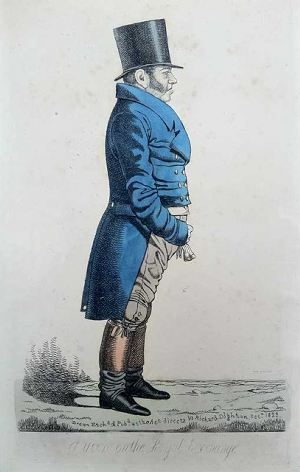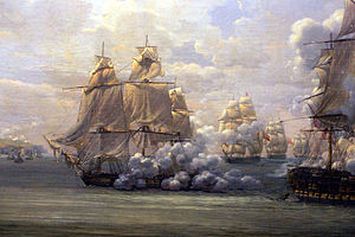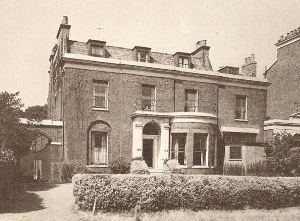The Clapham Society Local History Series — 23
The Duke of Danzig
by Peter Jefferson Smith
This article first appeared in the South London Press on 26 May 2017
(Entitled: ‘Fortunes made speculating on the war effort’)

The Thorntons of Clapham were a pious, respectable lot. At Henry Thornton’s house on the West Side of the Common, the Clapham Sect gathered to plan their campaigns that ended the iniquitous slave trade. But in 1815, another Thornton arrived at 84 West Side. Richard Thornton was not related to the other Thorntons, and no one could have called him pious or respectable.
Richard Thornton made his money as a merchant and speculative trader in the City, mainly on the Baltic Exchange. With his elder brother, he had started in business in the early years of the nineteenth century, a time of great difficulty and risk for Britain and British trade. Europe was engulfed in war, with most of the continent under the control of the French under Napoleon. For years, Britain stood alone, our access to Europe closed by the Napoleonic blockade. This was particularly damaging for our trade with Russia and the Baltic, which our shipping depended on, for supplies of timber, tar and above all hemp.
To enforce the blockade, a French army division was stationed at Danzig (now Gdansk) and all the forts along the shore were guarded. The Danish government made trading with Britain a felony punishable by death. The British navy twice fought the Danes to keep the Baltic open, but it was still extremely dangerous.
It was in these conditions that Thornton made his fortune and reputation. In 1810, he was commissioned by the Admiralty to get as much hemp as he could out of Russia for rigging our fleet. He armed one of his own ships, and set off himself, leaving his brother Laurence in charge of the business in London. He fought off a Danish gunboat, to land at Memel (in what is now Lithuania) posing as German. From there he went into Russia and stayed several months buying hemp, returning to England with several thousand tons.
Two years later, he did even better financially. This time, Laurence was in Memel, where he got news of Napoleon’s retreat from Moscow. He sent an express message back to Richard in London, who got the news three days before anyone else, including the Cabinet.

With the French in retreat, Richard knew that supplies of scarce Baltic produce, currently at peak wartime prices, would now became available; so he went around the City making large bargains for forward delivery of hemp, tallow, hides and other goods. He was said to have made over £100,000 from these dealings, and for years afterwards was nicknamed the Duke of Danzig.
After the war, he branched out into trade all over the world, though he kept a strong stake in the Russia trade. Tallow was a particularly speculative commodity; it was indispensible for daily life, and practically the whole supply came from St Petersburg. Supplies were erratic and huge fortunes could be made and lost. As ever, Thornton took great risks, but he chose the risks most likely to pay off. He also became a major ship-owner and was also a Lloyds underwriter. He specialised in ships carrying bullion and coinage – high risk again.
Thornton had a reputation for cockney oratory and was an inveterate gambler and betting man. He did well on the turf, and so it said, even placed a bet that Queen Victoria would never give birth to twins. (He would have won.) He often used his wealth on good causes. He built a school in his native village and also financed almshouses. Overseas, he financed liberal and constitutional parties in Spain and Portugal, often with loans which had little chance of being repaid.

Unmarried, he led what a biographer describes as a life of “blameless irregularity” with his housekeeper, with whom he had four children. His son, named Richard Napoleon Lee, played cricket for Surrey.
Thornton died in 1865 worth nearly £3 million, the largest fortune left up to that time. It is easy to condemn him as an amoral speculator, making a (financial) killing from his country’s need in war. But it is unwise to pass judgements on people who lived a couple of centuries ago, and modern London has few inhibitions about making money. But on the whole, I don’t think that nineteenth century Clapham would have approved of its richest resident.